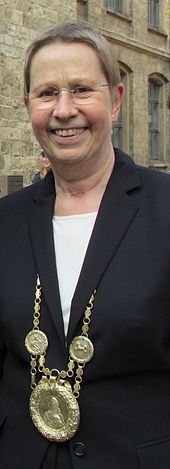Ulrike Beisiegel
Ulrike Beisiegel (born December 23, 1952 in Mülheim an der Ruhr ) is a German biochemist and university professor . From 2011 to 2019 she was President of the Georg-August-Universität Göttingen .
Professional background
Ulrike Beisiegel graduated from the Luisenschule Mülheim an der Ruhr . She then studied biology and biochemistry at the universities of Münster and Marburg . At the University of Marburg she received her doctorate in 1979 after studying human biology in the medical department (Dr. physiol.). Her further academic career led her to the University of Texas at Dallas in Dallas , where she worked with Joseph Leonard Goldstein and Michael S. Brown . After two more years as a research assistant in Marburg, she joined the University Medical Center Hamburg-Eppendorf in 1984 . After completing her habilitation in Hamburg in 1990, she became a C-3 professor there in 1996 and then director of the Institute for Biochemistry and Molecular Biology at the Eppendorf Clinic in 2001.
Ulrike Beisiegel became known as ombudswoman of the German Research Foundation , as senator of the Leibniz Association (since 2002) and as chairwoman of the Scientific Commission in the Science Council (since 2006) as a science politician.
The Senate of the Georg-August-Universität Göttingen unanimously elected Beisiegel as President of Georgia-Augusta for the six-year term of office beginning January 1, 2011, and thus as the successor to the biochemist and cell biologist Kurt von Figura . The foundation committee confirmed their choice. She became the first woman to head the university, which was founded in 1737. In 2012 she had to announce the departure of Göttingen from the Excellence Initiative.
Beisiegel was also involved in the natural scientist initiative Responsibility for Peace as an author for the peace movement and was on the board of directors of the Carl Friedrich von Weizsäcker Center for Science and Peace Research (ZNF) at the University of Hamburg. In addition to gender equality issues, Ulrike Beisiegel was involved in the women in cutting-edge research project. A study on the implementation of equal opportunities for women and men in the three funding guidelines of the Excellence Initiative. In 2016 there was a controversy over the non-renewal of Samuel Salzborn's professorship . After the renewed failure in the Excellence Strategy in September 2018, the first calls for resignation arose. In July 2019, Beisiegel announced that he wanted to leave office early at the end of September 2019. She explicitly mentioned that “the current discussions in the university about [her] administration” also contributed to the decision to resign. Her office was provisionally taken over by Vice President Valérie Schüller .
Awards
- 1983: Heinz Maier-Leibnitz Prize of the DFG (together with Reinhard Hohlfeld, Elisabeth Heywinkel and Harald Jüppner for their work on "Receptor Defects as a Cause of Disease")
- 1996: Honorary doctorate from the Medical Faculty of Umeå University , Sweden
- 2008: Rudolf Schönheimer Medal of the German Society for Arteriosclerosis Research
- 2014: Ubbo Emmius Medal from the University of Groningen
- 2015: Honorary Doctorate from the University of Edinburgh , United Kingdom
Web links
- Literature by and about Ulrike Beisiegel in the catalog of the German National Library
Individual evidence
- ↑ Prof. Dr. Ulrike Beisiegel will be the future President of the University of Göttingen , press release in the Information Service on March 10, 2010, accessed on March 11, 2010
- ↑ Thomas Vitzthum: When a top university is suddenly no longer "elite". In: Welt Online . April 27, 2015, accessed March 3, 2016 .
- ^ The case of Samuel Salzborn , taz.de, accessed on May 29, 2018
- ↑ Göttingen still has a chance - in theory. Retrieved August 24, 2019 .
- ↑ Press release: President is retiring. Press office of the University of Göttingen, July 18, 2019, accessed on July 18, 2019 .
- ↑ Press release: Farewell to University President Prof. Dr. Ulrike Beisiegel. Press office of the University of Göttingen, September 30, 2019, accessed on October 1, 2019 .
| predecessor | Office | successor |
|---|---|---|
| Kurt of Figura | President of the Georg-August-Universität Göttingen 2011–2019 |
Valérie Schüller |
| personal data | |
|---|---|
| SURNAME | Beisiegel, Ulrike |
| BRIEF DESCRIPTION | German biochemist, university professor and science politician |
| DATE OF BIRTH | December 23, 1952 |
| PLACE OF BIRTH | Mülheim an der Ruhr |
